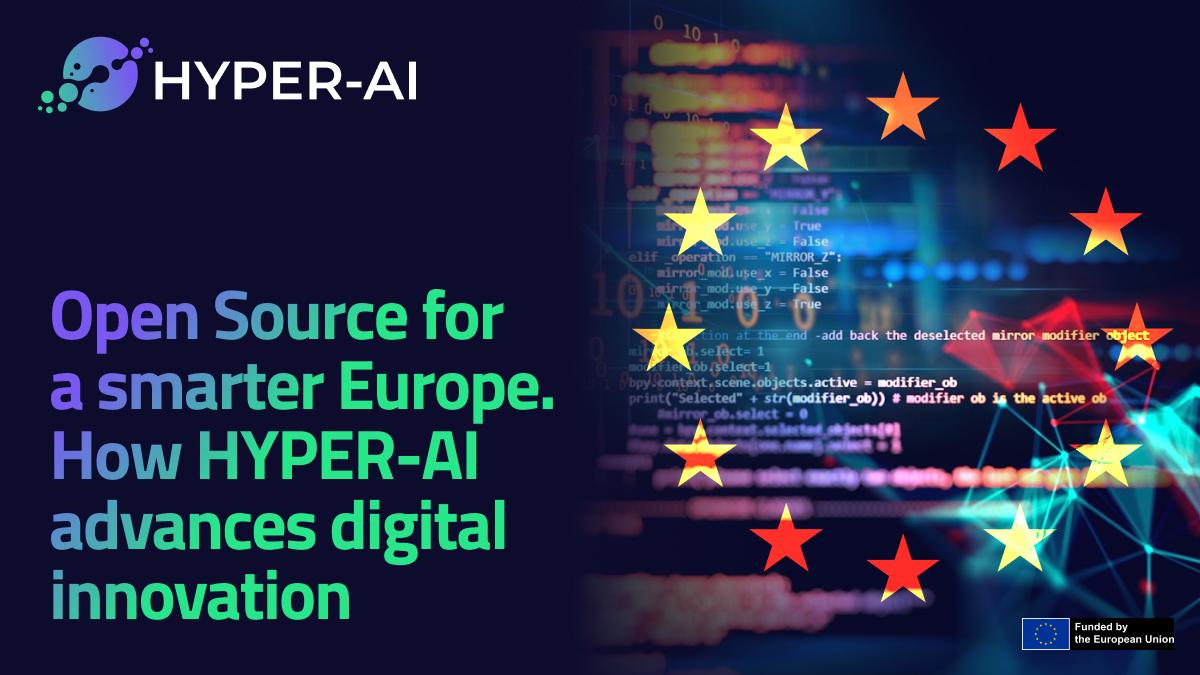Open Source for a smarter Europe: how HYPER-AI advances digital innovation
31, January, 2025
·3 minutes read
·

The concept of open source has fundamentally changed the way information flows in the digital space. Originally emerging from software development, open source refers to a model where code, designs, and knowledge are made publicly available, enabling modification, redistribution, and collective improvement. Beyond the software, open source can be considered like a philosophical approach that advocates transparency, collaboration, and shared innovation, creating a community-driven approach to technological progress.
Open source development has become a cornerstone of modern technological evolution. By facilitating unrestricted access to source code, it provides developers worldwide a space where to refine, improve, and customise digital solutions. The benefits are manifold, such as increased innovation, greater security through peer review, cost reduction, and the mitigation of vendor lock-in. More importantly, open source encourages a culture of knowledge exchange, where advancements are built upon existing frameworks rather than being reinvented in isolation.
Open Source in the HYPER-AI Project
HYPER-AI, a Horizon Europe-funded initiative, integrates open source principles to reshape distributed computing across IoT, Edge, and Cloud environments. By prioritising flexibility, interoperability, and sustainability, the project aligns with the European Commission’s goals of digital sovereignty and increased autonomy.. Furthermore, HYPER-AI increases collaboration among researchers, developers, and industry partners through an open ecosystem. Its technical framework incorporates open source technologies, including modular connectors and architectures that facilitate computing across diverse infrastructures. By aligning decentralised AI and open standards, the project builds a collaborative model where global contributions drive constant improvement.
The Strategic Role of Open Source
Open source methodologies within HYPER-AI unlock numerous advantages. Public access to source code accelerates innovation, ensuring that the solutions remain innovative. Transparency and security are reinforced through peer-reviewed, publicly available code, fostering trust and reliability. Cost-effective development is achieved by leveraging existing open source tools, enhancing resource efficiency. Adherence to open standards prevents vendor lock-in, promoting flexibility and independence from proprietary systems. Additionally, the active participation of a global developer community extends the project’s lifespan beyond its initial funding phase.
HYPER-AI’s open source strategy also integrates with the Eclipse Foundation’s governance model, benefiting from structured collaboration, transparent development infrastructure, and robust intellectual property management. This approach increases the chances of sustainability and accessibility while enriching Europe’s technological landscape.
Advancing Europe’s Digital Strategy
By cultivating an open computing ecosystem, HYPER-AI supports the European Commission’s strategic objectives for digital sovereignty and technological self-sufficiency. Open source significantly contributes to the EU economy by driving job creation and fostering an innovation-driven market. The project also advances open science, encouraging knowledge-sharing and collaborative research that reinforce Europe’s leadership in digital technologies. Beyond its technological impact, HYPER-AI actively engages with open source communities, ensuring broad adoption and integration across sectors. Participation in industry events, targeted communication efforts, and creating an engaged network of early adopters reinforce its long-term influence.
Future Prospects
As the project evolves, HYPER-AI aims to deepen collaboration with other Horizon Europe initiatives to further advance open source AI. Its contributions will play a key role in Europe’s digital competitiveness, aligning with regulatory frameworks like the AI Act. Additionally, HYPER-AI will support open hardware initiatives, such as RISC-V architectures, ensuring compatibility with next-generation computing infrastructures. By fully embracing open source, HYPER-AI is not only advancing distributed AI but also laying the foundation for a more open, collaborative, and sovereign European digital future. The project exemplifies how openness drives innovation, sustainability, and strategic technological autonomy in an interconnected world.
For further updates, visit our website and follow us on LinkedIn, X and Youtube to stay connected with the latest developments in HYPER-AI.